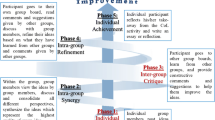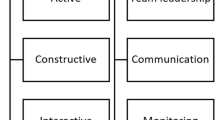Abstract
This paper proposes a novel approach to modeling cooperative learning sequences and the promotion of team and social competences in blended learning courses. In a case study – a course on Project Management for Computer Science students – the instructional design including individual and cooperative learning situations was modeled. Specific emphasis was put on visualizing the hypothesized development of team competences during the design stage. These design models were subsequently compared to evaluation results obtained during the course. The results show that visual modeling of planned competence promotion enables more focused design, implementation and evaluation of collaborative learning scenarios.
Preview
Unable to display preview. Download preview PDF.
Similar content being viewed by others
References
Cannon-Bowers, J.A., Tannenbaum, S.I., Salas, E., Volpe, C.E.: Defining competencies and establishing team training requirements. In: Guzzo, R., Salas, E. (eds.) Team effectiveness and decision making in organizations, pp. 333–380. Jossey Bas, San Francisco (1995)
European Commission: The Bologna process (2007), http://ec.europa.eu/education/policies/educ/bologna/bologna_en.html
European Commission: The European Qualifications Framework for Lifelong Learning (2008), http://ec.europa.eu/education/policies/educ/eqf/eqf08_en.pdf
Botturi, L., Stubbs, T.: Handbook of Visual Languages for Instructional Design. Information Science Reference, Hershey (2007)
Derntl, M., Motschnig-Pitrik, R.: coUML – A Visual Language for Modeling Cooperative Environments. In: Botturi, L., Stubbs, T. (eds.) Handbook of Visual Languages for Instructional Design: Theories and Practices, pp. 155–184. Information Science Reference, Hershey (2007)
Johnson, D., Johnson, R., Smith, K.A.: Cooperative Learning: Increasing College Faculty Instructional Productivity. The George Washington University, School of Education and Human Development, Washington, D.C. (1991)
Prichard, J.S., Bizo, L.A., Stratford, R.J.: The Educational Impact of Team-Skills Training: Preparing Students to Work in Groups. British Journal of Educational Psychology 76, 119–140 (2006)
Beatty, K., Nunan, D.: Computer-mediated collaborative learning. System 32, 165–183 (2004)
Strijbos, J.W., Martens, R.L., Jochems, W.M.G.: Designing for interaction: Six steps to designing computer-supported group-based learning. Computers & Education 42, 403–424 (2004)
Fellers, J.W.: Teaching teamwork: exploring the use of cooperative learning teams in information systems education. The DATA BASE for Advances in Information Systems 27, 44–60 (1996)
Reinmann-Rothmeier, G., Mandl, H.: Unterrichten und Lernumgebungen gestalten. In: Krapp, A., Weidenmann, B. (eds.) Pädagogische Psychologie, Beltz Verlag, Weinheim (2001)
Seymour, E., Hewitt, N.M.: Talking About Leaving: Why Undergraduates Leave the Sciences. Westview Press (1997)
Springer, L., Stanne, M., Donovan, S.: Effects of Small-Group Learning on Undergraduates in Science, Mathematics, Engineering, and Technology: A Meta-Analysis. Review of Educational Research 69, 21–51 (1999)
Johnson, D., Johnson, R., Stanne, M.B.: Cooperative Learning Methods: A Meta-Analysis (2000)
Johnson, D., Johnson, R.: Cooperative Learning And Social Interdependence Theory (1998)
Ruiz, U.B.C., Adams, S.G.: A conceptual framework for designing team training in engineering classrooms. In: Proc. American Society for Engineering Education Annual Conference & Exposition, Salt Lake City, UT (2005)
Ulloa, B.C.R., Adams, S.G.: Enhancing teaming skills in engineering management students through the use of the Effective Team Player – Training Program (ETP-TP). In: Proc. American Society for Engineering Education Annual Conference & Exposition (2004)
Buckenmyer, J.A.: Using Teams for Class Activities: Making Course/Classroom Teams Work. Journal of Education for Business, 98–107 (2000)
Parry, S.B.: Just What is a Competency? (And Why Should You Care?). Training 35, 58–64 (1998)
Baker, D.P., Horvarth, L., Campion, M.A., Offermann, L., Salas, E.: The ALL Teamwork Framework. In: Murray, T.S., Clemont, Y., Binkley, M. (eds.) International Adult Literacy Survey, Measuring Adult Literacy and Life Skills: New Frameworks for Assessment, vol. 13, pp. 229–272. Ministry of Industry, Ottawa (2005)
Author information
Authors and Affiliations
Editor information
Editors and Affiliations
Rights and permissions
Copyright information
© 2009 Springer-Verlag Berlin Heidelberg
About this paper
Cite this paper
Figl, K., Derntl, M., Kabicher, S. (2009). Visual Modeling of Competence Development in Cooperative Learning Settings. In: Lytras, M.D., et al. Visioning and Engineering the Knowledge Society. A Web Science Perspective. WSKS 2009. Lecture Notes in Computer Science(), vol 5736. Springer, Berlin, Heidelberg. https://doi.org/10.1007/978-3-642-04754-1_19
Download citation
DOI: https://doi.org/10.1007/978-3-642-04754-1_19
Publisher Name: Springer, Berlin, Heidelberg
Print ISBN: 978-3-642-04753-4
Online ISBN: 978-3-642-04754-1
eBook Packages: Computer ScienceComputer Science (R0)




